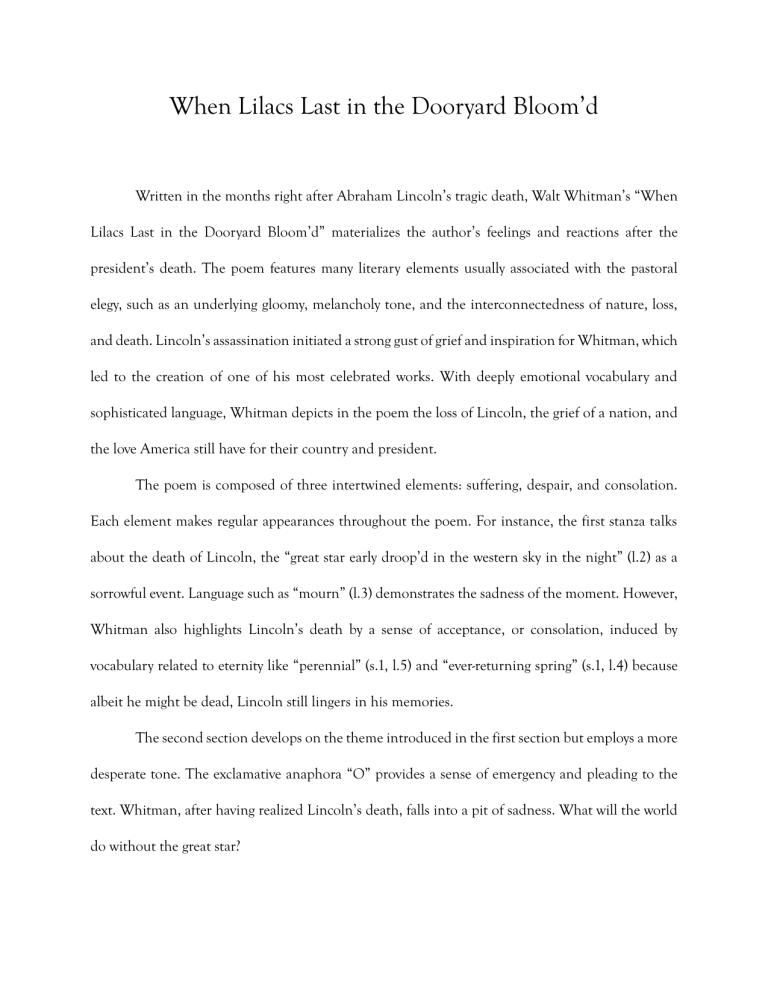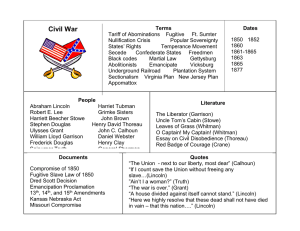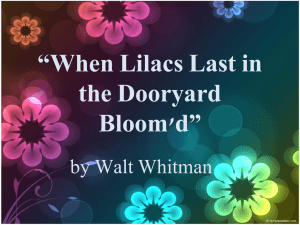
When Lilacs Last in the Dooryard Bloom’d Written in the months right after Abraham Lincoln’s tragic death, Walt Whitman’s “When Lilacs Last in the Dooryard Bloom’d” materializes the author’s feelings and reactions after the president’s death. The poem features many literary elements usually associated with the pastoral elegy, such as an underlying gloomy, melancholy tone, and the interconnectedness of nature, loss, and death. Lincoln’s assassination initiated a strong gust of grief and inspiration for Whitman, which led to the creation of one of his most celebrated works. With deeply emotional vocabulary and sophisticated language, Whitman depicts in the poem the loss of Lincoln, the grief of a nation, and the love America still have for their country and president. The poem is composed of three intertwined elements: suffering, despair, and consolation. Each element makes regular appearances throughout the poem. For instance, the first stanza talks about the death of Lincoln, the “great star early droop’d in the western sky in the night” (l.2) as a sorrowful event. Language such as “mourn” (l.3) demonstrates the sadness of the moment. However, Whitman also highlights Lincoln’s death by a sense of acceptance, or consolation, induced by vocabulary related to eternity like “perennial” (s.1, l.5) and “ever-returning spring” (s.1, l.4) because albeit he might be dead, Lincoln still lingers in his memories. The second section develops on the theme introduced in the first section but employs a more desperate tone. The exclamative anaphora “O” provides a sense of emergency and pleading to the text. Whitman, after having realized Lincoln’s death, falls into a pit of sadness. What will the world do without the great star? Whitman finds the answer in the vitality of his surroundings. He contrasts the momentary impact of Lincoln’s death on himself with the powerful, abiding flow of life. As soon as the third stanza, descriptions of nature make their appearance. The “lilac-bush tall-growing with heart-shaped leaves of rich green” symbolizes Whitman’s ineffable love for Lincoln. The poet idealizes the plant, depicting it as “delicate” (s.3, l.3), “with every leaf a miracle” (s.3, l.4), bestowing it with an almost ethereal quality. The sprig he breaks off it represents Lincoln’s death, torn from the flow of life, hurting Whitman’s feelings for him. When observed up close, one can discern the absence within the lilac bush, symbolizing a void left by Lincoln's death. However, from a distance, this gap seems to fade, leaving the lilac unchanged. Similarly, no one can see the grief Whitman feels except for him. He employs a thrush to better express his pain. He “sings by himself a song./ The song of the bleeding throat,/ Death’s outlet song of life, …” (s.4, l.5-7) because without wailing, he could not bear the pain of Lincoln’s death. He needs to let grief wash over him before finding consolation. The imaginary procession of Lincoln’s coffin traveling across the United States starts in stanza five. The anaphors throughout stanzas five and six highlight the aspect of a passing coffin, of repetition, over and over again, through different places, always followed by affliction and lament. When calling death “sacred” (s.7, l.3) and “sane” (s.7, l.4), Whitman sees death as a step toward rebirth. He brings live flowers to the coffin, metonymy for death itself. In expectance of Lincoln’s rebirth in the American spirit, Whitman comes “with loaded arms” (s.7, l.8) of roses for love, lilies for rebirth, and lilac for eternity. Lincoln died but was at the same time reborn and immortalized in the mind of the American people. Whitman develops on the theme of rebirth. Although the “western orb [is] sailing the heaven” (s.8, l.1), “it bent to me [Whitman] night after night” (s.8, l.4). Whitman keeps Lincoln in thought always, which is reflected in the similar sentence beginnings with the word “as” (s.8, l.3-9). He cannot leave Lincoln yet, although he is almost ready to move on. From a representation of grief, the thrush evolves in a call to life; an invitation to rejoin the flow of existence. Whitman has transcended his initial feelings of despair. He now wonders how he should honor the death of Lincoln, drawing a parallel between material goods he could offer and his own tribute as a poet. How can he sing his “song for the large sweet soul that has gone?” (s.10, l.2). He honors Lincoln’s death by relating him to life, metaphorizing his spirit present in the mind of the American people even after his death. The various scenes of life, located in Lincoln’s burial chamber, connect him to the United States, suggesting that Lincoln shaped America as it was. Vocabulary such as “the South and the North” (s.12, l.3) and “Manhattan,” (s.12, l.2) “Missouri,” (s.12, l.3) and “Ohio” (s.12, l.3) illustrates the unity Lincoln was able to insufflate in the United States. The anaphors at the start of every sentence about American land do sound repetitive, but they also build up to the bird who “sings on” (s.13, l.1), “limitless out of the dusk, out of the cedars and pines” (s.13, l.3). Stanza nine finds the bird –Whitman’s grief– warbling more insistently than ever, the apogee of the author’s sorrow. Whitman does, however, find comfort in the departure of Lincoln and is slowly reminded of life by the scent of the lilac. He comes back to his senses, reminded that a death is a departure, but also a renewal. Section 14 depicts American life at its fullest; it represents the beauty and freedom of the United States, but also the past “perturb’d winds and the storms” (s.14, l.4) of the Civil war. As the past departs, represented by the ships sailing, Whitman rediscovers mundane America, with its numerous houses and cities and “minutia of daily usages” (s.14, l.8). The difference, now, is that he has seen death through Lincoln. Instead of letting himself overcome by grief, he embraces death and welcomes it as a “strong deliveress” (s.14, l.40) and “dark mother,” (s.14, l.36) which differs from his earlier feeling of acceptance, but not of welcoming. Whitman discovers the delicacy of temporality. The short lifespan of living things only makes them more valuable and memorable. He composes a free-standing italicized poem in “When Lilacs Last in the Dooryard Bloom’d” for this concept of welcoming death as a friend, which gives time and life even more importance. Finally, Whitman understands that he must abandon his love for Lincoln, leave him where he is. He realizes that “the slain soldiers of the war (a metonymy for Lincoln)…/…were not as was thought,/… they suffer’d not” (s.15, l.17-19) , which brings him consolation. He leaves everything that held him back, “passing the visions” (s.16, l.1), “passing the song of the hermit bird” (s.16, l.3), and “passing … [the] lilac with heart-shaped leaves” (s.16, l.9) to find reassurance. He rips away from the symbolic elements holding him in sorrow over Lincoln’s death. The elegy ends with the “Lilac and star and bird twined with the chant of my soul,/ There in the fragrant pines and the cedars dusk and dim.” (s.16, l.21-22) The word there truly indicates a separation between Lincoln, who is there, and Whitman, who is here, among life, away from the cause of his sadness. The elegy is complete: Whitman has found solace.



